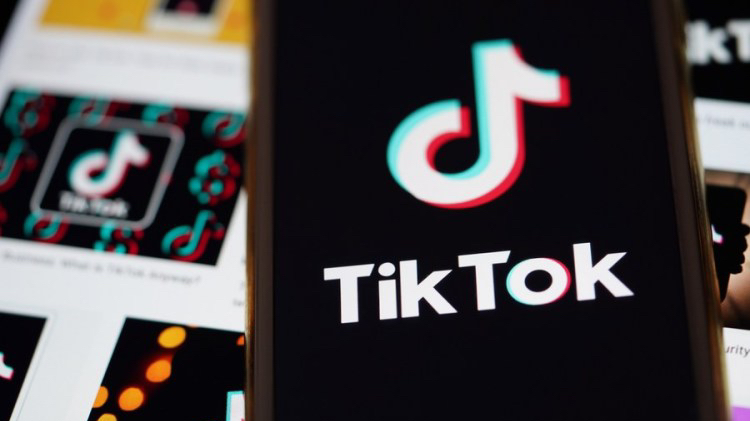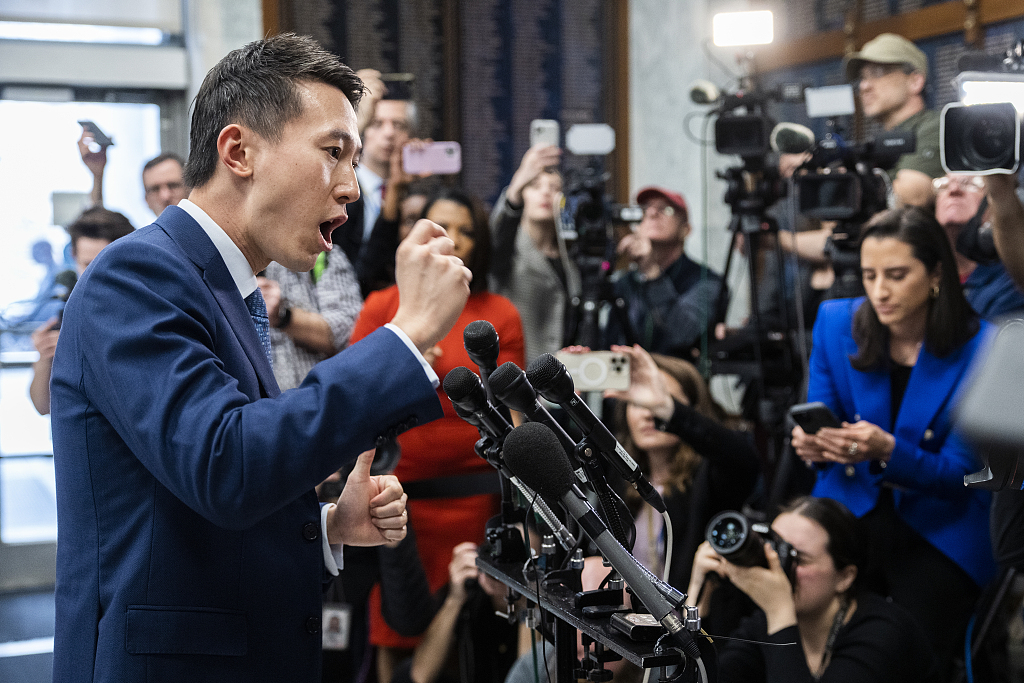
The logo of TikTok is seen on the screen of a smartphone in Arlington, Virginia, the U.S. /Xinhua
The logo of TikTok is seen on the screen of a smartphone in Arlington, Virginia, the U.S. /Xinhua
Editor's note: Daryl Guppy is an international financial technical analysis expert. He has provided a weekly Shanghai Index analysis for media for the Chinese mainland for more than a decade. Guppy appears regularly on CNBC Asia and is known as "The Chart Man." He is a former national board member of the Australia China Business Council. The article reflects the author's opinions, and not necessarily those of CGTN.
In an unsurprising move, the Australian government has recently succumbed to pressure from the United States to ban TikTok on government-issued phones. Pressure to do this has been mounting from China hawks within the Parliament and it's questionable whether the decision was reached on the basis of Australian analysis, or if it is just a follow-my-leader decision.
TikTok Australia General Manager, Lee Hunter said the company was disappointed by the decision. "We are also disappointed that TikTok, and the millions of Australians who use it, were left to learn of this decision through the media, despite our repeated offers to engage with government constructively about this policy," he said. At least the Americans asked Shou Zi Chew, CEO of TikTok America, to present evidence to the congressional inquiry, but not so in Australia.
Previously accepting at face value the false conclusions of the U.S. security and intelligence establishment led Australia into an illegal war in Iraq. That too was "verified" by Australian intelligence services without applying critical independent analysis. The TikTok's decision echoes the same process and exposes a weakness in the way these policy decisions are reached.
The decision is an interesting compromise and leaves Australian politicians between a rock and TikTok. The opposition party lost a recent by-election in a previously safe Liberal party seat. It was a seat where Chinese social media platforms, TikTok and WeChat played an important role in the election campaigns mounted by both candidates.
This may explain why the ban applies only to government-issued phones, but not to phones privately purchased and used by politicians and other government officials. Social media in all its forms has become an essential tool for serving and aspiring politicians. Social media is also an essential tool for reaching into particular ethnic groups to promote a range of government initiatives. Does this decision mean that these channels are now closed, unless of course, they are transferred to a private phone communication?
It seems that government-issued phones, which are also used for private phone communication, are at risk, but private phones are not at risk. This makes a heroic assumption that no official business is ever discussed on a private phone.
The decision also has the potential to place Australia in a difficult position in the future. Despite the U.S. covers story of security concerns, these concerns are eliminated if TikTok is sold to an American company. The recent TikTok hearings in the United States made it obvious that this was about mafia-capitalism rather than security. The clear purpose was to force the sale of TikTok to American interests and so "snuff out" the competition.

Shou Zi Chew, CEO of TikTok America, addresses the media before testifying at the House Energy and Commerce Committee hearing titled "TikTok: How Congress Can Safeguard American Data Privacy And Protect Children From Online Harms" in Rayburn Building, Washington, D.C., the U.S., March 23, 2023. /CFP
Shou Zi Chew, CEO of TikTok America, addresses the media before testifying at the House Energy and Commerce Committee hearing titled "TikTok: How Congress Can Safeguard American Data Privacy And Protect Children From Online Harms" in Rayburn Building, Washington, D.C., the U.S., March 23, 2023. /CFP
Where does it leave the Australian decision if the United States succeeds in forcing a transfer of TikTok ownership to an American company so the security concerns magically disappear? Will Australia dutifully follow the U.S. lead and declare that TikTok is no longer a security threat? Or will Australia bloody-mindedly maintain its position despite U.S. decision to the contrary further leaving Australia between a rock and TikTok.
That's a decision for the future and how Australia handles it will be closely watched by regional neighbors for evidence of sound decision-making. Is it evidence-based or politically motivated? The fact that the decision has been made without any formal inquiry in Australia suggests it is political and that evidence is irrelevant to the decision.
The Australian Department of Home Affairs is exploring onshore data storage requirements, known as data localization or data residency, as part of a National Data Security Action Plan. U.S. technology giants Amazon, Google and Meta are against general data localization requirements, according to their submissions. In contrast, just as in the U.S., TikTok has cooperated with these proposals. This makes the singling out of TikTok by Australia further evidence of duplicity and suggests the ban is politically driven.
Australia, like the United States, has legislation requiring social media companies to cooperate with security and intelligence services so the idea that this obligation is unique to China is absolutely false.
The decision is unlikely to be much more than an irritant to China, although the direction of policy making will be noted. There is a steady procession of Australian states' leaders visiting China and this reflects the economic reality of the two neighboring countries' relationship. These developments are more significant than the TikTok decision.
However, irritant or not, this is further evidence of Australia's retreat from independent foreign policy decisions. This erodes Australia's ability to promote independent solutions in regional forums as it is more easily dismissed as uncritically echoing U.S. perspectives.
This Australian decision is a fabulous own-goal that serves only the objectives of the security and intelligence apparatus while further undermining Australia's diplomatic efforts in the region.
(If you want to contribute and have specific expertise, please contact us at opinions@cgtn.com. Follow @thouse_opinions on Twitter to discover the latest commentaries in the CGTN Opinion Section.)